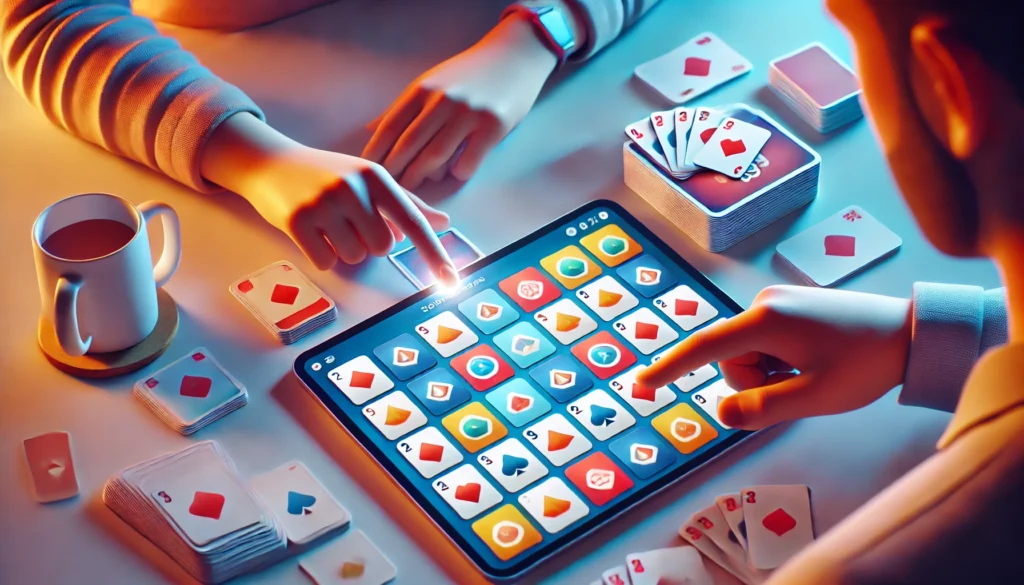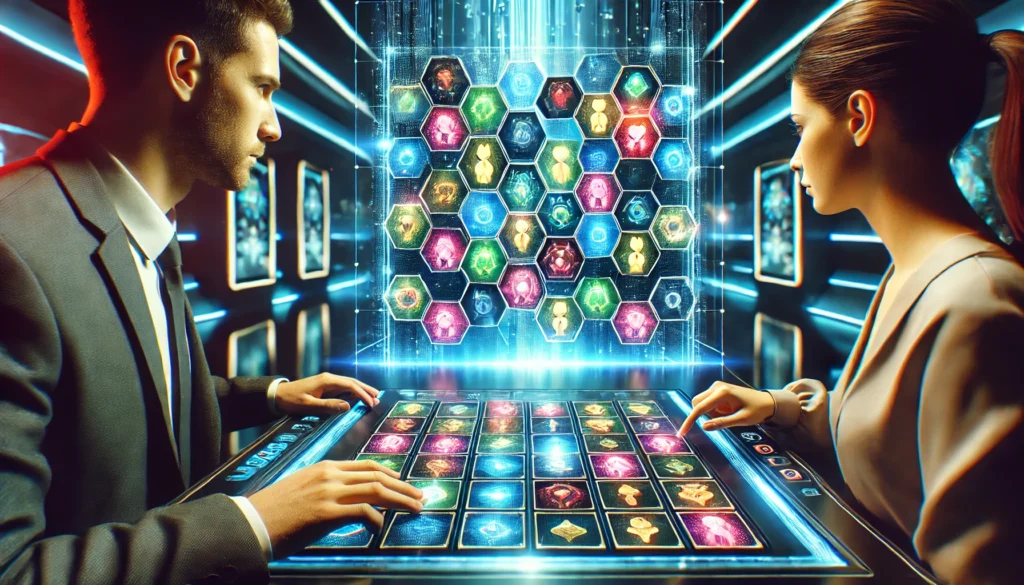The Google Memory Game is a digital adaptation of the classic memory game, designed to be played by two people. The objective is simple: match pairs of cards by remembering their locations. It requires players to concentrate, recall information, and strategize, making it an ideal activity for cognitive enhancement.
You may also like: Boost Your Mind: Top Brain Games
The Mechanics of the Game
The Google Memory Game is structured on a grid format, typically featuring an even number of cards laid face down. Each turn allows a player to flip over two cards, with the goal of finding matching pairs. This straightforward setup belies a deeper complexity, as it challenges players to engage their short-term memory and pattern recognition skills. The game’s design encourages a balance between speed and accuracy, rewarding those who can efficiently recall card positions.
The Role of Short-Term Memory
Short-term memory plays a crucial role in the Google Memory Game. It acts as the temporary storage facility for card positions, allowing players to track and remember the locations of previously revealed cards. This memory type is often likened to a mental workspace where information is actively processed and manipulated. Enhancing short-term memory through games like this can lead to improvements in daily tasks, such as remembering phone numbers or shopping lists.
The Cognitive Demand
The game demands cognitive engagement, requiring players to utilize both memory recall and strategic thinking. It’s not merely about luck or chance; success in the Google Memory Game is predicated on the ability to remember and predict card locations. This dual engagement of memory and strategy makes the game an excellent exercise for cognitive development, as it encourages players to refine their mental processes and improve their cognitive flexibility.
Why Play the Google Memory Game?
Playing the Google Memory Game offers more than just entertainment; it serves as a tool for cognitive development. Engaging in such memory exercises can improve mental focus, enhance concentration, and boost overall brain health. For health and wellness professionals, this game can be a valuable recommendation for clients seeking to enhance their cognitive abilities.
Cognitive Development Benefits
The Google Memory Game supports cognitive development by engaging multiple brain functions simultaneously. Players must recall information, analyze patterns, and make strategic decisions, all of which stimulate different areas of the brain. Regular participation in such games can lead to improved neural connectivity and overall cognitive resilience. The game serves as a mental workout, strengthening the brain much like physical exercise strengthens muscles.
Mental Health Advantages
Beyond cognitive development, the game offers significant mental health benefits. Engaging in memory games has been shown to reduce stress and anxiety by providing a focused, enjoyable activity that occupies the mind. It can also foster a sense of accomplishment and boost self-esteem as players improve their skills. For individuals experiencing cognitive decline, memory games can provide a sense of control and empowerment.
Social Interaction and Connectivity
As a two-player game, the Google Memory Game also promotes social interaction and connectivity. Playing with a partner encourages communication, cooperation, and friendly competition. It can be a bonding experience, offering an opportunity for shared enjoyment and mutual support. This social aspect enhances the game’s appeal, making it a versatile activity suitable for family gatherings, social events, or online play with friends.

The Science Behind Memory Games
Memory games, such as the Google Memory Game, are not merely recreational; they are grounded in cognitive science principles. Research suggests that engaging in memory exercises can lead to neuroplasticity—the brain’s ability to reorganize itself by forming new neural connections. This adaptability is crucial for cognitive resilience and longevity.
Cognitive Benefits
- Enhanced Memory Retention: Regular practice of memory games strengthens the hippocampus, the brain region responsible for memory formation and retrieval. This leads to improvements in both short-term and long-term memory performance. Engaging in memory games promotes neural growth and connectivity, enhancing overall cognitive function.
- Improved Focus and Attention: Concentration required during gameplay translates to improved attention spans in everyday tasks. Memory games encourage players to develop and refine their focus, leading to better performance in a variety of cognitive tasks. Improved attention and focus are valuable skills that enhance both academic and professional performance.
- Increased Problem-Solving Skills: Strategizing in games fosters critical thinking and problem-solving abilities, which are transferable to real-world scenarios. Memory games encourage players to develop and refine their strategic thinking skills, leading to improved cognitive flexibility and adaptability. These skills are valuable in a wide range of cognitive tasks, including decision-making and creative thinking.
Neuroplasticity and Cognitive Resilience
Neuroplasticity is the brain’s ability to adapt and change in response to new experiences and challenges. Engaging in memory games promotes neuroplasticity, leading to improvements in cognitive resilience and overall brain health. Regular participation in memory games encourages the formation of new neural connections, enhancing cognitive function and adaptability. This adaptability is crucial for maintaining cognitive health and preventing cognitive decline.
The Role of Memory Games in Cognitive Health
Memory games play a critical role in promoting cognitive health and preventing cognitive decline. By engaging in regular memory exercises, individuals can enhance their cognitive function and overall brain health. Memory games encourage the development of strong neural connections, leading to improvements in memory retention, focus, and problem-solving skills. These cognitive benefits are valuable in a variety of tasks, including academic and professional performance.
Practical Applications and Future Implications
The Google Memory Game, while simple, has practical applications beyond entertainment. Health and wellness coaches can integrate it into cognitive training programs, while biohackers may use it as a tool for brain optimization. Furthermore, as digital and cognitive technologies evolve, memory games could play a role in future therapeutic interventions for cognitive impairments.
Integrating Memory Games into Daily Life
Incorporating memory games into daily routines can be a proactive step towards cognitive health. Set aside time each day to engage in memory exercises, whether through digital platforms like the Google Memory Game or traditional card games. Regular participation in memory games promotes cognitive resilience and overall brain health, enhancing cognitive function and adaptability.
Creating a Memory Game Routine
Creating a memory game routine involves setting aside dedicated time each day for memory exercises. By establishing a consistent routine, individuals can ensure they engage in regular cognitive workouts, leading to improvements in memory retention, focus, and problem-solving skills. A structured routine also encourages the development of strong neural connections, enhancing overall cognitive function.
Incorporating Memory Games into Cognitive Training
Incorporating memory games into cognitive training programs can enhance their effectiveness and overall impact. By integrating memory exercises into structured training programs, health and wellness professionals can promote cognitive resilience and overall brain health. Memory games encourage the development of strong neural connections, leading to improvements in memory retention, focus, and problem-solving skills.
Encouraging Regular Participation
Encouraging regular participation in memory games can lead to lasting improvements in cognitive function and overall brain health. By promoting the benefits of memory games and encouraging individuals to engage in regular memory exercises, health and wellness professionals can enhance cognitive resilience and overall brain health. Regular participation in memory games promotes neural growth and connectivity, leading to improvements in memory retention, focus, and problem-solving skills.

The Future of Cognitive Gaming
As research into cognitive health progresses, the integration of technology and gaming is likely to expand. Future developments may include personalized cognitive games tailored to individual brain profiles, offering targeted benefits and real-time feedback. These advancements could revolutionize cognitive training programs, leading to improvements in cognitive function and overall brain health.
Personalized Cognitive Games
Personalized cognitive games offer targeted benefits and real-time feedback, enhancing the effectiveness of cognitive training programs. By tailoring games to individual brain profiles, developers can create personalized experiences that promote cognitive resilience and overall brain health. Personalized cognitive games encourage the development of strong neural connections, leading to improvements in memory retention, focus, and problem-solving skills.
The Role of Technology in Cognitive Gaming
Technology plays a critical role in the development and implementation of cognitive gaming programs. By leveraging advancements in digital technology, developers can create engaging and effective cognitive training experiences that promote cognitive resilience and overall brain health. Technology also enables real-time feedback and personalized experiences, enhancing the effectiveness of cognitive training programs.
Future Implications for Cognitive Health
The future of cognitive gaming holds significant implications for cognitive health and overall brain function. As research into cognitive health progresses, the integration of technology and gaming is likely to expand, leading to improvements in cognitive function and overall brain health. These advancements could revolutionize cognitive training programs, promoting cognitive resilience and overall brain health.

Conclusion
The Google Memory Game offers a unique blend of fun and cognitive exercise, making it an ideal activity for those interested in mental wellness. By employing strategic approaches and understanding the game’s cognitive benefits, players can not only improve their performance but also enhance their overall brain health. As you explore the world of memory games, remember that the journey to cognitive mastery is as rewarding as the game itself. Engage, enjoy, and elevate your mental prowess through the strategic play of the Google Memory Game. The benefits of memory games extend beyond entertainment, promoting cognitive resilience and overall brain health. By incorporating memory games into daily routines and cognitive training programs, individuals can enhance their cognitive function and overall brain health, leading to lasting improvements in memory retention, focus, and problem-solving skills.
Further Reading:
Important Note: The information contained in this article is for general informational purposes only, and should not be construed as health or medical advice, nor is it intended to diagnose, prevent, treat, or cure any disease or health condition. Before embarking on any diet, fitness regimen, or program of nutritional supplementation, it is advisable to consult your healthcare professional in order to determine its safety and probable efficacy in terms of your individual state of health.
Regarding Nutritional Supplements Or Other Non-Prescription Health Products: If any nutritional supplements or other non-prescription health products are mentioned in the foregoing article, any claims or statements made about them have not been evaluated by the U.S. Food and Drug Administration, and such nutritional supplements or other health products are not intended to diagnose, treat, cure, or prevent any disease.


